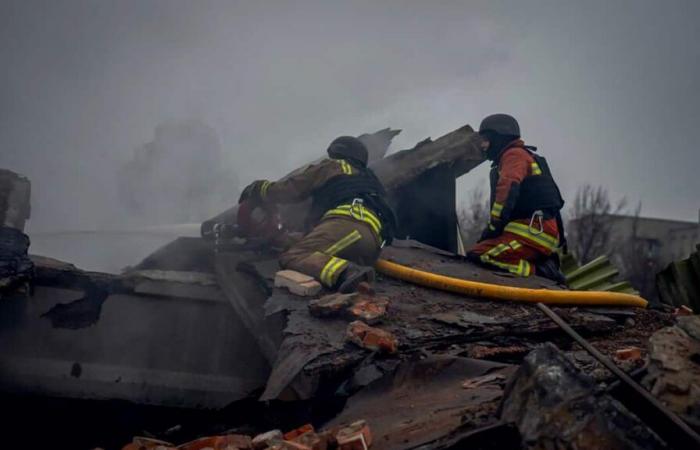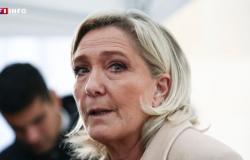More than a million Ukrainians were left without electricity Thursday morning after a new “massive” Russian air attack on energy infrastructure, amid escalating threats from Moscow against Ukraine and the West.
• Also read: Ukraine: Russia launches record night attack with 188 drones
• Also read: Ukraine says it presents fragments of new Russian missile after strike on Dnipro
• Also read: Ukraine: two dead in Russian strikes in the northeast
This wave of attacks comes at a time when Moscow is intensifying its military pressure on Ukraine, while awaiting, like the Europeans, the arrival at the White House in January of the unpredictable Donald Trump.
Russia has been attacking Ukrainian energy infrastructure for almost three years, in order to undermine the morale of the population and handicap the logistics of the Ukrainian army, a tactic which has so far clashed with the resilience of the Ukrainians and the teams. maintenance which repairs the damage caused by the bombings.
While temperatures were around 0°C on Thursday, “once again, the energy sector is subject to a massive attack by the enemy,” the Ministry of Energy, German Gualouchchenko, lamented Thursday morning on Facebook.
There are “emergency cuts throughout the country”, noted on Facebook the boss of one of the electricity supply companies, Yasno, Sergiï Kovalenko, who specified that these could last at least until the evening.
In the western region of Lviv, more than 500,000 customers were plunged into darkness, according to Governor Maksym Kozytskiï, and 215,000 inhabitants in neighboring Volyn.
In the Rivné region, 280,000 people are deprived of running water according to regional authorities.
The Kyiv region, the Ivano-Frankivsk and Khmelnytsky regions are also experiencing power cuts, but the authorities have not quantified the affected population.
In the south, the mayor of Mykolaiv, Oleksandr Senkevych, announced that trams and trolleybuses were not running due to the cuts, and that schools would remain closed all day.
“Wage war on civilians”
On Tuesday, Russia had promised a “response” – without specifying the contours – to two new Ukrainian strikes with American ATACMS missiles against its territory in the previous days.
Last week, Vladimir Putin warned the West, following the very first Ukrainian attacks carried out with Western missiles against Russian soil, that Moscow reserved the right to directly attack the countries which help kyiv or even to once again fire its “Orechnik” intermediate-range hypersonic missile against Ukraine.
For President Volodymyr Zelensky’s chief of staff, Andriï Iermak, Russia “continues its terror tactics” and wants to “wage war on civilians during (…) the winter.”
For its part, the Russian Ministry of Defense claimed to have destroyed 25 Ukrainian drones overnight over the Bryansk region, close to Belarus, Crimea and the Rostov region (south).
On the front, Moscow is making territorial gains at an unprecedented speed since the start of 2022 against a weakened Ukrainian army, less than two months before Donald Trump takes office in the United States, which could constitute a turning point if the elected president came to reduce, or even completely stop, vital American aid to Kyiv.
On Wednesday, the administration of outgoing President Joe Biden called on kyiv to lower the minimum age for military mobilization to 18 years instead of the current 25 years to compensate for the lack of soldiers in the face of the advance of Russian forces, particularly around from the towns of Pokrovsk, Kurakhové and Koupiansk.
This call comes at a time when Donald Trump could adopt a radically different approach and push Kyiv to negotiate with Moscow, a decision feared by the Europeans, who are trying to put on a united front in the meantime.
“Not enough soldiers”
In this very uncertain context, a senior official of the current American administration declared on Wednesday on condition of anonymity that Ukraine was facing an “existential” crisis in the recruitment of new volunteers.
“The truth is that Ukraine is currently not mobilizing and training enough soldiers,” he said coldly.
Kyiv has already lowered the minimum age for mobilization this year from 27 to 25, without however replenishing its ranks.
Donald Trump, for his part, announced that he would appoint former general Keith Kellogg, 80, who called on Kyiv for several concessions, as an emissary to end the war between Ukraine and Russia.
Very critical of the billions of dollars released by Washington for Kyiv, the president-elect promised to resolve the war between Ukraine and Russia even before taking the oath of office on January 20 – without ever explaining how.






